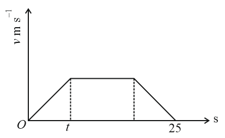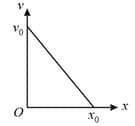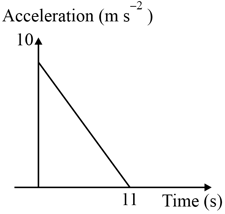Graphical Representation of Motion
Graphical Representation of Motion: Overview
This topic covers concepts such as Graphical Analysis of Motion, Position - Time Graphs, Displacement - Time Graphs, Distance - Time Graphs, Velocity - Time Graphs, Acceleration - Time Graphs, Some Important Motion Graphs, and Speed-time Graph.
Important Questions on Graphical Representation of Motion
The figure shows the graph of a particle moving in a straight line. Starting from rest, the time after which the particle returns to its starting position is

The velocity-time graph of the particle moving along a straight line is shown. The rate of acceleration and deceleration is constant and it is equal to . If average velocity during the motion is , then find the value of

Which of the following curve does not represent motion in one dimension?
The velocity displacement graph of a particle moving along a straight line is -

The most suitable acceleration-displacement graph will be
A body starts from rest at time , refer to the acceleration-time graph shown in the figure. The maximum velocity attained by the body will be

Two trains, which are moving along different tracks in opposite directions, are put on the same track due to a mistake. Their drivers, on noticing the mistake, start slowing down the trains when they are 300 m apart. Graphs given below show their velocities as a function of time as they slow down. The separation between the trains, when both have stopped, is :

Which of the following best represents a velocity time graph corresponding to the position time graph shown ?

All the graphs below are intended to represent the same motion. One of them does it incorrectly. Pick it up.
Which graph corresponds to an object moving with a constant negative acceleration and a positive velocity?
Acceleration time graph of a particle moving in a straight line is shown. Velocity of particle at is . The velocity (in )of the particle at the end of fourth second is

The speed verses time graph for a particle is shown in the figure. The distance travelled (in ) by the particle during the time interval to will be __________ .

The graph below shows the variation with time of the velocity of an object moving on a straight line.

Which of the graphs below best represents the variation with time of the acceleration of the object?
An object is moving along -axis. If its position (in meter) at any time (in ) is given by the following graph, then the object is at rest about

If the velocity of a particle moving along a straight line decreases linearly with its displacement is to a value approaching to zero at then
acceleration of the particle at , is

Acceleration (a)-time(t) graph for a particle starting from rest at is as given below. The particle has maximum speed at

The velocity-time graph of a particle undergoing straight line motion is as shown in the figure. The corresponding distance-time graph can be best represented by

The position-time graphs of two particles and are as shown in the figure. The ratio of speeds of and is:

The acceleration time graph of a particle moving along a straight line is shown. At what time particle acquires its initial velocity :-

A particle starts its motion from rest and moves with constant acceleration for time and then it retards with constant rate for time until it comes to rest. Then the ratio of maximum speed and average speed during the complete motion will be
Acceleration versus velocity graph of a particle moving in a straight line starting from rest is as shown in figure. The corresponding velocity-time graph would be :-

